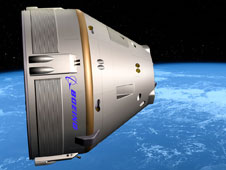
Artist's concept of Boeing's CST-100 vehicle in orbit. Credit: Boeing
This new 15-year agreement between NASA and Boeing is part of the planned future for development of space transportation systems at the Kennedy Space Center under the new Commercial Crew Program at NASA. The program is designed to build a bridge between NASA and private corporations to innovate and remain economically competitive in the aerospace industry.
“Kennedy is moving forward,” said Bob Cabana, the center’s director. “Partnerships are going to be key.”
According to Boeing, the CST-100 program, which should be launch ready by 2015, will create about 550 jobs at the space center by the time the program is in full production. The first steps toward that goal will be some renovations inside the Orbiter Processing Facility-3 inside the Vehicle Assembly Building which was used to prepare the recently retired Space Shuttle fleet for launch.
The CST-100 is a reusable capsule design with a capacity to transport up to 7 crew members into orbit. This crew launch system is part of the new strategy at NASA which calls for astronaut crew members to be launched atop smaller rockets, separately from the cargo which is launched by heavy launch capable systems.
With the new deal in place, while Boeing focuses on getting the crew members into orbit, NASA will be able to focus its efforts on the development of the new Orion spacecraft meant for deep space missions, and on development of the Space Launch System heavy-lift rocket.
White House officials were pleased with the announced deal, President Obama, who has pushed for more privatization in the space industry wrote, “My administration will be pressing forward, in partnership with Space Florida and the private sector, to create jobs and make surer America continues to lead the world in exploration and discovery.”
Florida Lt. Gov. Jennifer Carroll, who also is the chairwoman of Space Florida, said that the deal took about 1 year to finalize.”I think we have it just right, that this is a true partnership,” Carroll said, “that all have an equal part in this and an equal opportunity in this and we can move forward with other companies that want to come in and have a public, private partnership with us.”
“This is just the first of much to come,” said Sen. Bill Nelson of Florida former astronaut who flew as a payload specialist on Columbia’s STS-61C mission in 1986. “You just wait until you see what’s coming here to the Kennedy Space Center in the future in the way of public/private partnerships.”
![Herbal Reference Substances are Key to Everyday Products <!-- AddThis Sharing Buttons above -->
<div class="addthis_toolbox addthis_default_style " addthis:url='http://newstaar.com/herbal-reference-substances-are-key-to-everyday-products/3512112/' >
<a class="addthis_button_facebook_like" fb:like:layout="button_count"></a>
<a class="addthis_button_tweet"></a>
<a class="addthis_button_pinterest_pinit"></a>
<a class="addthis_counter addthis_pill_style"></a>
</div>When it comes to quality control testing and the development of new products, Botanical Reference Materials (BRMs), also known as Herbal References are critically important. To help companies ultimately obtain all-important FDA approval, the Food and Drug Administration provides in its guidance a recommendation that […]<!-- AddThis Sharing Buttons below -->
<div class="addthis_toolbox addthis_default_style addthis_32x32_style" addthis:url='http://newstaar.com/herbal-reference-substances-are-key-to-everyday-products/3512112/' >
<a class="addthis_button_preferred_1"></a>
<a class="addthis_button_preferred_2"></a>
<a class="addthis_button_preferred_3"></a>
<a class="addthis_button_preferred_4"></a>
<a class="addthis_button_compact"></a>
<a class="addthis_counter addthis_bubble_style"></a>
</div>](http://newstaar.com/wp-content/uploads/2021/02/Achillea_millefolium_flowers-100x100.jpg)
![Quality Electrochemical Biosensors are Critical for Medical, Food and Chemical Industry <!-- AddThis Sharing Buttons above -->
<div class="addthis_toolbox addthis_default_style " addthis:url='http://newstaar.com/quality-electrochemical-biosensors-are-critical-for-medical-food-and-chemical-industry/3512086/' >
<a class="addthis_button_facebook_like" fb:like:layout="button_count"></a>
<a class="addthis_button_tweet"></a>
<a class="addthis_button_pinterest_pinit"></a>
<a class="addthis_counter addthis_pill_style"></a>
</div>A number of industries have, at their core, a need to frequent or even continuous analysis of biological media. These include the medical and pharmaceutical fields, biotech firms, and food and chemical companies. To maintain quality standards and develop new products, these industries rely heavily […]<!-- AddThis Sharing Buttons below -->
<div class="addthis_toolbox addthis_default_style addthis_32x32_style" addthis:url='http://newstaar.com/quality-electrochemical-biosensors-are-critical-for-medical-food-and-chemical-industry/3512086/' >
<a class="addthis_button_preferred_1"></a>
<a class="addthis_button_preferred_2"></a>
<a class="addthis_button_preferred_3"></a>
<a class="addthis_button_preferred_4"></a>
<a class="addthis_button_compact"></a>
<a class="addthis_counter addthis_bubble_style"></a>
</div>](http://newstaar.com/wp-content/uploads/2020/10/Electrochemical-Biosensor-100x100.jpg)
![Company Develops Industrial Mixers Well-Suited for both Fragile and Explosive Products <!-- AddThis Sharing Buttons above -->
<div class="addthis_toolbox addthis_default_style " addthis:url='http://newstaar.com/company-develops-industrial-mixers-well-suited-for-both-fragile-and-explosive-products/3512071/' >
<a class="addthis_button_facebook_like" fb:like:layout="button_count"></a>
<a class="addthis_button_tweet"></a>
<a class="addthis_button_pinterest_pinit"></a>
<a class="addthis_counter addthis_pill_style"></a>
</div>Industrial drum mixers are normally applied to blend mixes of varying viscosities such as adhesive slurries or cement. Some of these mixers have the capability of blending mixes of very different particle sizes such as fruit and ice cream, and gravel and cement slurry. The […]<!-- AddThis Sharing Buttons below -->
<div class="addthis_toolbox addthis_default_style addthis_32x32_style" addthis:url='http://newstaar.com/company-develops-industrial-mixers-well-suited-for-both-fragile-and-explosive-products/3512071/' >
<a class="addthis_button_preferred_1"></a>
<a class="addthis_button_preferred_2"></a>
<a class="addthis_button_preferred_3"></a>
<a class="addthis_button_preferred_4"></a>
<a class="addthis_button_compact"></a>
<a class="addthis_counter addthis_bubble_style"></a>
</div>](http://newstaar.com/wp-content/uploads/2020/06/bandeau-sofragir2-100x100.jpg)